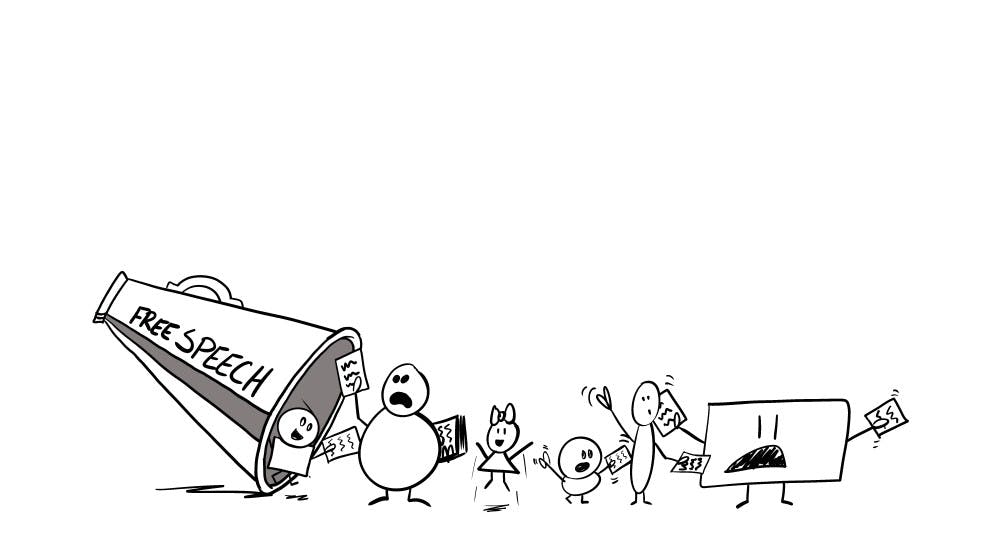THE UNIVERSITY OF SOUTH CAROLINA cracks the top 10 on a lot of lists. We’ve got the No. 1 Honors College, the No. 1 undergraduate international business major, and we’re ranked third in the world for our sports science program. But there’s another list we’ve got a spot on, one that’s also home to Georgetown, Fordham and Harvard. It’s the Foundation for Individual Rights in Education’s 2017 list of the top ten worst schools in America for free speech.
Free speech is a fan favorite issue in our country, one that we’ve always been willing to step up and ardently defend when the need arises. So where does that need exist at USC? According to the Foundation for Individual Rights in Education (FIRE) our policies on racial discrimination, sexual harassment, and even the Carolinian Creed are guilty of infringements on First Amendment rights; they argue that these policies restrict freedom of speech and conscience. Another part of USC’s constitution the organization criticizes is our policy on what you could call “free speech zones.”
These zones have been implemented at universities all over the country as a way to give students an environment and platform to exercise their First Amendment rights while also allowing the universities to run without interruptions. Others argue that this is the United States of America, everywhere’s a free speech zone, and to trying to confine it to a designated area violates the Constitution. While USC doesn’t explicitly call them “free speech zones,” there are areas on campus set aside for public demonstrations or solicitation (Davis Field, Greene Street and Pickens Bridge are a few). You have to apply and get the administration’s approval to use them, which only adds to our transgression in the eyes of FIRE. So where does the problem lie? If it’s in our nation’s constitution, don’t we have the right to totally free speech on campus?
No, according to Logic and Ethics Professor Jim Stiver. “I no longer believe that you have a constitutional right to free speech on campus,” he told me when I sat down with him in January.
Not totally, anyway. He asked me if I thought I had the right to come into his house and insult his wife. I said that I did have the right to do it, but that he’d also have the right and my permission to throw me to the curb. He nodded at my answer, adding, “I don’t think it’s the government’s business to prosecute you for what you said, but if it’s on my property, your rights are curtailed.”
He described a speech he’d seen by Yale Law Dean Robert Post that applies the same logic to free speech on campus. Post argues that in order to serve their purpose — to educate, to encourage critical thinking and curiosity — universities are within their rights to implement policies like the Carolinian Creed and our sexual harassment policy. Which isn’t to say universities don’t overstep their bounds or overreact in some cases. It’s just their prerogative to do what they can to create an environment conducive to learning. It sounds fair enough, but why do things like free speech zones still draw so much extreme criticism from both sides of the aisle?
The enemy here, in a lot of cases, is precedent. People think that if they allow or regulate free speech in certain instances, the same policy has to be applied to all. Stiver quoted Aristotle in response to this, saying “Justice is treating equals equally and unequals unequally.” Administrations love dichotomies. People love dichotomies. Right and Wrong. Black and White. Freedom and Censorship. It’s a major flaw in how we perceive things, especially issues of free speech. Every case is different, with its own characters and contexts and complications. Its natural to want to find an easier way to process these things, but the case of individuals’ rights is too important. With rights come responsibilities, and our responsibilities as students are to learn and create a place for others to learn.



